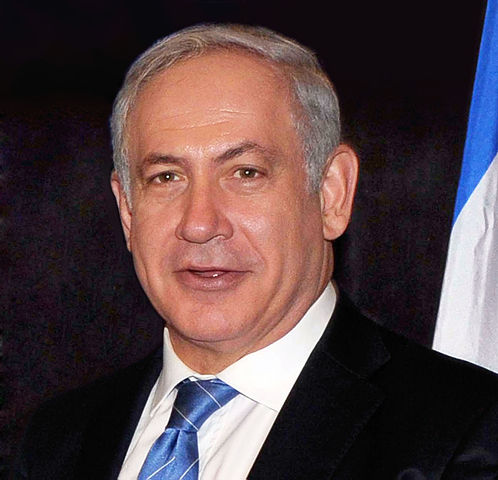UPDATES
What did Netanyahu really say about a Palestinian state?
March 18, 2015 | Ahron Shapiro

It has been widely reported in Australia and elsewhere that Israeli Prime Minister Binyamin Netanyahu “ruled out” a Palestinian state in an interview with the Israeli website NRG on Monday. However, most reports have left out a crucial portion from the translation from the original Hebrew of Netanyahu’s remarks which would better explain his true position.
A story which appeared on the ABC website on Monday, sourced from Reuters and the AFP, offers a good example of how the story was commonly misreported:
Israeli prime minister Benjamin Netanyahu has ruled out the establishment of a Palestinian state if he is re-elected, in comments on the eve of a snap general election.
Asked by Israeli news site NRG if no Palestinian state would arise should he remain prime minister, Mr Netanyahu said: “Indeed.”
But what did Netanyahu actually say [emphasis added]?:
NRG REPORTER: Some of the people are deciding between Bayit Hayehudi and Likud. You said your Bar Ilan speech isn’t relevant. Are you the same as Bennett in your ideology that you won’t create a Palestinian state?
PM NETANYAHU: I think that anyone who goes to create today a Palestinian state and turns over land, is turning over land that will be used as a launching ground for attacks by Islamist extremists against the State of Israel.
That’s the actual reality that has been formed here in recent years. Whoever ignores this is sticking his head in the sand. The Left does this, sticks their head in the sand, time after time. We’re realists and understand. The test is who will form the next government. I’m not going to give in. They wouldn’t amass the heavy campaign against me if they thought that I’m not the barrier. They understand this. We’ve stood up against strong pressure and we’ll continue to do so.
NRG REPORTER: If you are the prime minister, a Palestinian state won’t be created?
PM NETANYAHU: Indeed.
Missing from reports is the context of the interview, which was Netanyahu’s assertion earlier this month that his 2009 Bar Ilan speech calling for the creation of a demilitarized Palestinian state was no longer relevant.
Netanyahu is further explaining his previous statement, by clarifying that the situation has changed since 2009 in contrast to how they are “hayom” – today. As a result of the rise of Islamist extremists “in recent years”, a Palestinian state would be used by Islamist extremists as a staging ground for attacks against Israel, he argues.
This current reality, as he sees it, is the source of his opposition to a Palestinian state. He does not “rule out” the creation of a Palestinian state ever, he only says he does not see it as a safe option for Israel in the short term.
Hebrew University Political Science Professor Abraham Diskin further clarified this during an interview with the ABC’s Eleanor Hall on “The World Today” Wednesday, March 18.
ELEANOR HALL: And yet only a few days ago it looked like this election would be the end for Benjamin Netanyahu.
How critical in delivering this late surge back to him was that last minute statement that there would be no Palestinian state if he were returned as prime minister?
ABRAHAM DISKIN: Yeah, I think that it was very important for Netanyahu not to be that far from behind, and what you quoted really helped to move voters.
But what he said was not that he’s against that. He said he cannot leave them now with all the terrorism and ISIS and Syria, so now it’s not really relevant anymore.
The difference between that and what has been reported is not merely semantics, but explains what Netanyahu sees as the pragmatic reality which explains his change of perspective and emphasis since his Bar Ilan speech.
The question that must be asked is why Netanyahu felt the need to make such a statement in an interview at that particular time instead of avoiding taking a stand that would be sure to be misinterpreted abroad, as indeed it has been.
Here, Netanyahu’s remarks must be seen in light of his effort in the final week to attract voters from Naftali Bennett’s right-wing Jewish Home party as well as security-minded Herzog voters.
His campaign strategy, which appears to have been successful beyond what most pundits predicted, was to emphasise that he offered a safer pair of hands to deal with crucial security issues than his opponents, and that is exactly what the quote in question conveys.
Given the intense pressure from Washington to implement a two-state resolution with the Palestinians in the short term, for Netanyahu to say that he would not support the creation of a Palestinian state in his next term was not easy and was guaranteed to further antagonise the White House.
However, facing a challenge from Zionist Union (which appeared to be surging in the polls in the last week of the campaign), one can reason that differentiating the policies of the Netanyahu-led Likud from the policies of the Zionist Union was something that Netanyahu felt was politically imperative.
That said, Netanyahu was ruling out a Palestinian state until issues like the rise of ISIS and the growth of other Islamist groups like al-Nusra in neighboring Syria are resolved – and undoubtedly, mindful of the turn towards delegitimising Israel by the Palestinian Authority and the ongoing internal conflict with Hamas – but not forever.
In fact, recently leaked documents from 2011 show he was then prepared to contemplate a deal on terms not that different from those his predecessors Ehud Barak and Ehud Olmert offered in 2000-2001 and 2008, respectively.
Ahron Shapiro
Tags: Israel





